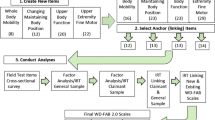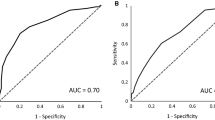Objectives: Functional Capacity Evaluations (FCE) are used for making return-to-work decisions, yet FCE's modest predictive ability is currently outweighed by the administrative burden of testing. We attempted to develop a short-form FCE while maintaining comparable predictive ability. Methods: Three databases previously created for evaluating FCE predictive validity were used. Subjects were compensation claimants with low back disorders. FCE measures included items in the Isernhagen Work Systems’ FCE. Days until benefit suspension served as an indicator of return-to-work. Analysis included Cox regression. Results: Three items, floor-to-waist lift, crouching, and standing, were maintained in the short-form FCE. The short-form FCE was found to predict comparably to the entire FCE protocol in two validation cohorts (R 2 difference<3%). Subjects meeting job demands on all three items consistently experienced faster benefit suspension. Conclusion: A short-form FCE for determining future work status in claimants with low back disorders was developed. A substantially abbreviated FCE may offer an efficient alternative.



Similar content being viewed by others
REFERENCES
King PM, Tuckwell N, Barrett TE. A critical review of functional capacity evaluations. Phys Ther 1998; 78(8): 852–866.
Hazard RG. Spine update. Functional restoration. Spine 1995; 20(21): 2345–2348.
Innes E, Straker L. A clinician's guide to work-related assessments: 1-purposes and problems. Work 1998; 11: 183–189.
Finch E, Brooks D, Stratford P, Mayo N. Physical rehabilitation outcome measures: A guide to enhanced clinical decision making, 2nd edn. Toronto: Canadian Physiotherapy Association, 2002.
Gross DP. Measurement properties of performance-based assessment of functional capacity. J of Occup Rehab 2004; 14(3): 166–174.
Gross DP, Battié MC. Reliability of safe maximum lifting determinations of a functional capacity evaluation. Phys Ther 2002; 82(4): 364–371.
Gross DP, Battie MC. Construct validity of a kinesiophysical functional capacity evaluation administered within a worker's compensation environment. J Occup Rehabil 2003; 13(4): 287–295.
Gross DP, Battie MC, Cassidy JD. The prognostic value of functional capacity evaluation in patients with chronic low back pain: part 1: Timely return to work. Spine 2004; 29(8): 914–919.
Gross DP, Battie MC. The prognostic value of functional capacity evaluation in patients with chronic low back pain: part 2: Sustained recovery. Spine 2004; 29(8): 920–924.
Gross DP, Battie MC. Predicting timely recovery and recurrence following multidisciplinary rehabilitation in patients with compensated low back pain. Spine 2005; 30(2): 235–240.
Matheson LN, Isernhagen SJ, Hart DL. Relationships among lifting ability, grip force, and return to work. Phys Ther 2002; 82(3): 249–256.
Fishbain DA, Cutler RB, Rosomoff H, Khalil T, Abdel-Moty E, Steele-Rosomoff R. Validity of the dictionary of occupational titles residual functional capacity battery. Clin J Pain 1999; 15(2): 102–110.
Cutler RB, Fishbain DA, Steele-Rosomoff R, Rosomoff HL. Relationships between functional capacity measures and baseline psychological measures in chronic pain patients. J Occup Rehabil 2003; 13(4): 249–258.
Gross DP, Battié MC. Functional Capacity Evaluation performance does not predict sustained return to work in claimants with chronic back pain. J Occup Rehabil 2005; 15: 285–294.
Gross DP, Battié MC, Cassidy JD. The prognostic value of functional capacity evaluation in patients with chronic low back pain: Part 1. Timely return to work. Spine 2004; 29(8): 914–919.
Reneman MF, Dijkstra PU, Westmaas M, Goeken LN. Test-retest reliability of lifting and carrying in a 2-day functional capacity evaluation. J Occup Rehabil 2002; 12(4): 269–275.
Brouwer S, Reneman MF, Dijkstra PU, Groothoff JW, Schellekens JMH, Goeken LNH. Test-retest reliability of the Isernhagen Work Systems Functional Capacity Evaluation in patients with chronic low back pain. J Occup Rehabil 2003; 13: 207–218.
Krause N, Dasinger LK, Deegan LJ, Brand RJ, Rudolph L. Alternative approaches for measuring duration of work disability after low back injury based on administrative workers’ compensation data. Am J Ind Med 1999; 35(6): 604–618.
Amick BC 3rd, Habeck RV, Hunt A, et al. Measuring the impact of organizational behaviours on work disability prevention and management. J Occup Rehabil 2000; 10(1): 21–38.
Hosmer DW, Lemeshow S. Applied survival analysis: Regression modeling of time to event data, 1st, edn. New York: Wiley, 1999.
Ruan CM, Haig AJ, Geisser ME, Yamakawa K, Buchholz RL. Functional capacity evaluations in persons with spinal disorders: predicting poor outcomes on the Functional Assessment Screening Test (FAST). J Occup Rehabil 2001; 11(2): 119–132.
ACKNOWLEDGMENTS
Data collection was facilitated by the Alberta Workers’ Compensation Board/Millard Health.
Author information
Authors and Affiliations
Corresponding author
Rights and permissions
About this article
Cite this article
Gross, D.P., Battié, M.C. & Asante, A. Development and Validation of a Short-Form Functional Capacity Evaluation for Use in Claimants with Low Back Disorders. J Occup Rehabil 16, 50–59 (2006). https://doi.org/10.1007/s10926-005-9008-x
Published:
Issue Date:
DOI: https://doi.org/10.1007/s10926-005-9008-x




